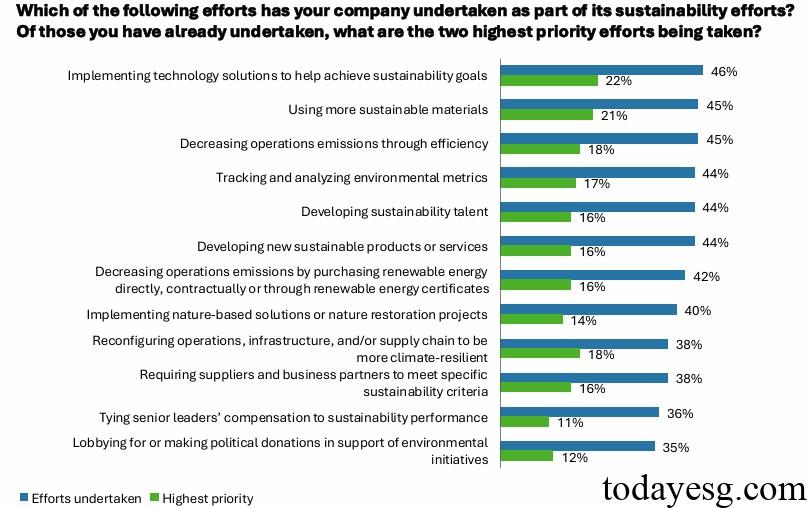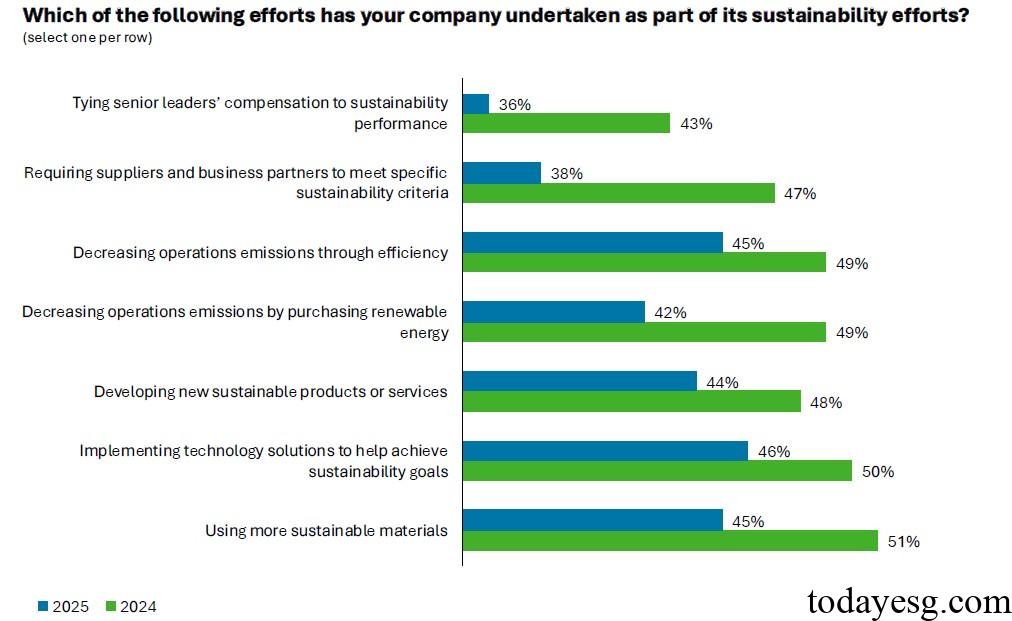2025 C-suite Sustainability Report
Deloitte releases 2025 C-suite Sustainability Report, which aims to summarize executives’ attitudes towards corporate sustainability.
Deloitte surveys over 2100 corporate executives from 27 countries, including Chief Executive Officer (CEO) (16%), Chief Sustainability Officer (CSO) (15%), Chief Technology Officer (CTO) (13%), and others.
Related Post: United Nations Global Compact Releases 2025 CEO Sustainable Development Report
2025 C-suite Sustainability Report Analysis
The results of this report indicate that sustainable development remains the most important priority for businesses, and their investments are constantly increasing.enterprises, and their investments are constantly increasing. 45% of executives believe that sustainability is the most pressing challenge for the next year, higher than technological innovation (44%), economy (38%), and supply chain (37%). 83% of enterprises have increased their sustainable development investments, and 22% of large enterprises (with annual revenue exceeding $10 billion) have seen sustainable investment growth of over 20%. 40% of companies consider sustainability as a strategic core, while 39% incorporate it into their business processes.
In the past year, technology investment (37%), regulatory policies (33%), and talent (33%) have been the main factors affecting the sustainable development actions of enterprises.In the past year, technology investment (37%), regulatory policies (33%), and talent (33%) have been the main factors affecting the sustainable development actions. When evaluating sustainable development actions and investments, sustainable development impact (29%) and economic benefits (25%) are the main factors. The main actions of enterprises include implementing technological solutions to achieve sustainable development goals (46%) and using more sustainable materials (45%). These actions are most closely related to corporate revenue (66%), regulation (61%), and reputation (60%), with a negative impact on these areas of less than 10%.

Technological progress, especially artificial intelligence, has been widely used in the field of sustainable development for enterprises. 65% of enterprises use this technology to improve efficiency and reduce emissions, 58% use it to analyze data and generate reports, 53% use it for scenario analysis and risk modeling, and 52% use it to develop sustainable products and services. Executives believe that artificial intelligence technology helps companies automate data management and establish measurable sustainability commitments.
2025 C-suite Sustainability Report Challenges
Progress in some sustainable actions of enterprises slowdown in 2025, such as linking executive compensation to sustainability (43% in 2024 to 36% in 2025) and requiring suppliers and partners to comply with sustainability standards (47% in 2024 to 38% in 2025). In terms of the challenges faced by environmental sustainability actions, the difficulty of measuring environmental impact (21%), the demand for short-term investors (21%), and the lack of sustainable solutions (21%) account for a relatively high proportion.

In terms of sustainable issues affecting business operations, the impact of weather on the operating environment (33%), regulatory policies to reduce carbon emissions (30%), and investors’ sustainable consumption preferences (30%) are the main factors. Executives believe that pressure from regulatory agencies (77% in 2022 to 58% in 2025), investors (71% in 2022 to 58% in 2025), and the board of directors (75% in 2022 to 60% in 2025) is decreasing, which may affect the sustainable actions of the company. In terms of the challenges faced in preparing sustainable reports, the constantly changing regulatory environment (41%) and data challenges (40%) are the main factors.
Progress in some sustainable actions of enterprises slowdown in 2025, such as linking executive compensation to sustainability (from 43% in 2024 to 36% in 2025) and requiring suppliers to meet sustainability standards (from 47% in 2024 to 38% in 2025). The biggest obstacles faced by enterprises in terms of environmental sustainability include difficulty in measuring environmental impact (22%), focusing on recent business challenges (21%), and a lack of sustainable solutions (21%).
The main issues that companies consider having an impact on sustainable development include the influence of weather factors on operations, the impact of carbon reduction environmental policies, and changes in consumption pattern preferences. Enterprises believe that pressure from regulatory agencies (77% in 2022 to 58% in 2025), investors (71% in 2022 to 58% in 2025), and boards of directors (75% in 2022 to 60% in 2025) are decreasing, which may reduce their efforts to engage in sustainable actions. In terms of sustainable reporting, the main challenges faced by enterprises are the constantly changing sustainable regulatory environment (41%) and sustainable data challenges (40%).
Reference:





